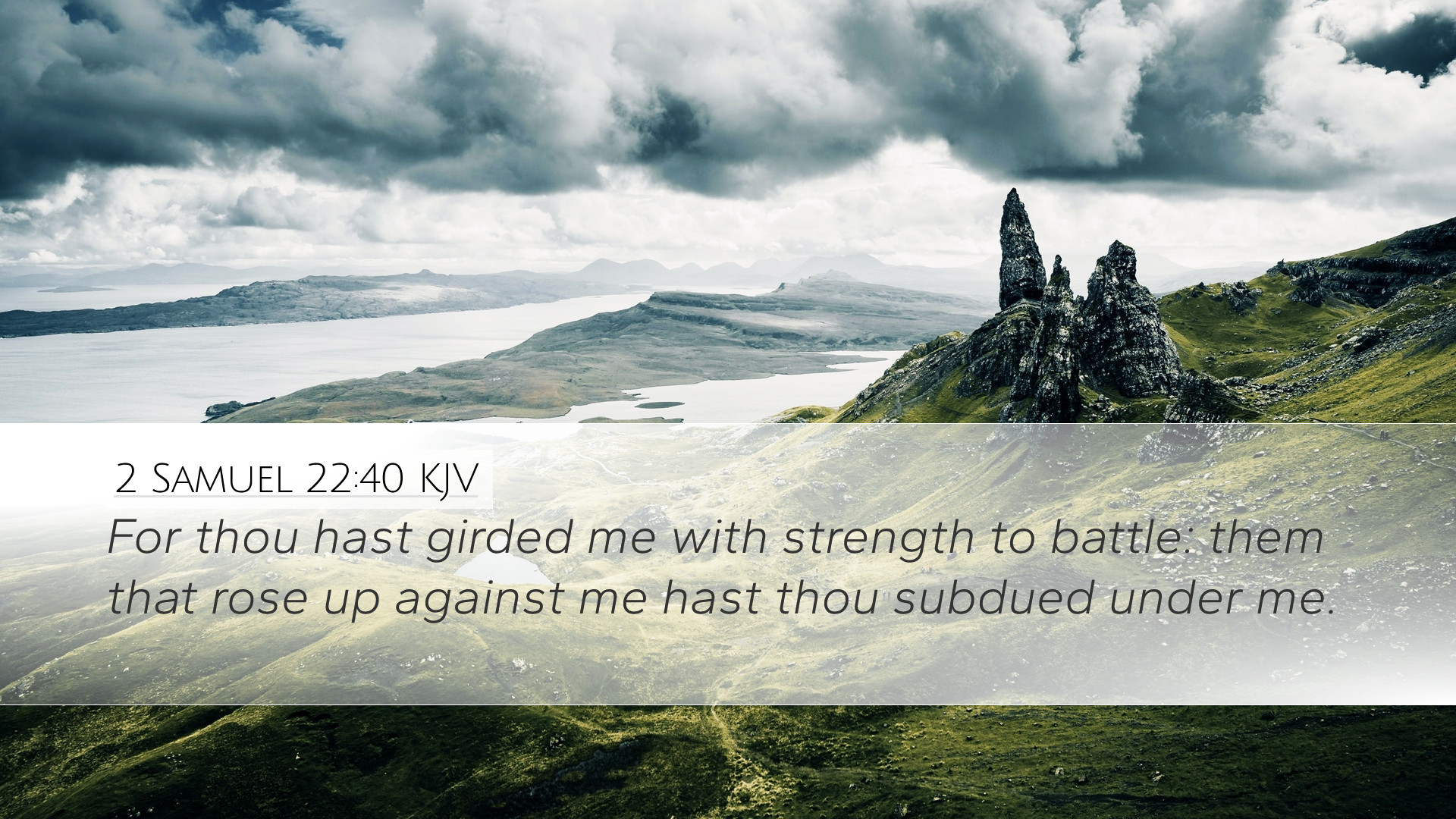Commentary on 2 Samuel 22:40
Verse: "For thou hast girded me with strength to battle: them that rose up against me hast thou subdued under me."
Introduction
The verse 2 Samuel 22:40 encapsulates a profound moment of divine intervention and personal empowerment in the life of David, serving as a prelude to understanding God’s role in the struggles of man. This commentary will explore themes of strength, victory, and divine support, drawing insights from renowned public domain commentaries.
Contextual Analysis
This scripture occurs within a psalm attributed to David, reflecting on the numerous times God delivered him from his enemies. David’s victory over formidable foes is a recurring theme in this passage, conveying the message that ultimate strength and support come from God. Understanding the historical context—David’s battles against Saul, the Philistines, and other nations—gives depth to the emotional and spiritual significance of this verse.
Historical Overview
The events leading to this moment were filled with conflict and trials. David, anointed as king, often found himself in dire circumstances, where his leadership and reliance on God were tested. This verse is a declaration of gratitude and recognition of God’s enabling power in the face of overwhelming challenges.
Commentary Insights
Matthew Henry's Commentary
Matthew Henry emphasizes the theme of divine assistance: "David acknowledges that all his victories are the result of God's girding him with strength." David’s battles were not fought alone; they were fought with God’s empowerment which illustrates a vital principle of faith: reliance on God brings strength. Henry draws attention to the metaphor of being “girded,” signifying preparation and readiness for battle, implying that true strength originates from divine empowerment rather than human prowess.
Albert Barnes' Notes on the Bible
Barnes notes that the phrase “girded me with strength” suggests a complete outfitting for the task at hand, much like a warrior who puts on armor before entering battle. He asserts that this strength is not merely physical but encompasses emotional and spiritual dimensions, empowering David beyond his natural capabilities. Barnes indicates, "The acknowledgment of God's assistance is foundational in forming a believer's identity," which reveals a model for modern believers to embrace reliance over self-sufficiency.
Adam Clarke's Commentary
Clarke offers a unique perspective by reflecting on the original Hebrew terminologies used in the text. He expounds on the term “subdued,” interpreting it as the ultimate subjection of David’s enemies under his feet, a demonstration of triumph. Clarke elaborates, "This verse portrays the relationship between divine favor and human endeavor," interpreting victory as a collaborative success between God and man. He stresses that recognizing God's hand in our victories reinforces faith and encourages perseverance in spiritual battles.
Theological Themes
-
Divine Empowerment:
This verse sharply illustrates the theme of empowerment that believers gain from their faith. The acknowledgment that strength comes from God is crucial for spiritual warfare and everyday challenges.
-
Victory through Faith:
David’s declaration serves as an encouragement that faith leads to victory. This reflects the broader biblical narrative where reliance on God results in triumph over adversity.
-
God’s Sovereignty:
The control exerted by God over David’s enemies illustrates His sovereignty. In the life of every believer, recognizing God’s ultimate authority fosters trust and peace amid turmoil.
Practical Applications
For pastors, theologians, and students, there are essential lessons derived from 2 Samuel 22:40:
-
Relying on God:
In times of personal and communal struggle, believers are called to lean on God for strength. Pastoral leadership should encourage congregations to recognize God as the source of their resilience.
-
Preparation for Battle:
The metaphor of girding oneself for battle serves as a reminder of the need for spiritual preparation. Believers must equip themselves with faith, prayer, and knowledge of Scripture.
-
Celebrating Victories:
Recognizing and celebrating God’s victories in our lives fosters a culture of gratitude and encourages community support. Testimonies of God’s deliverance should be shared to inspire others.
Conclusion
2 Samuel 22:40 encapsulates a moment of clarity for David where he articulates the source of his strength and victory. As believers navigate their battles—be they personal, spiritual, or communal—they must remember that true empowerment is found in reliance on God. The insights drawn from historical analysis and commentary enrich our understanding and application of scriptural truths, calling us to embrace the divine girding that enables us to overcome. In all things, the acknowledgment of God's role in our lives is paramount for developing a deeper faith and resilience in the face of adversities.


